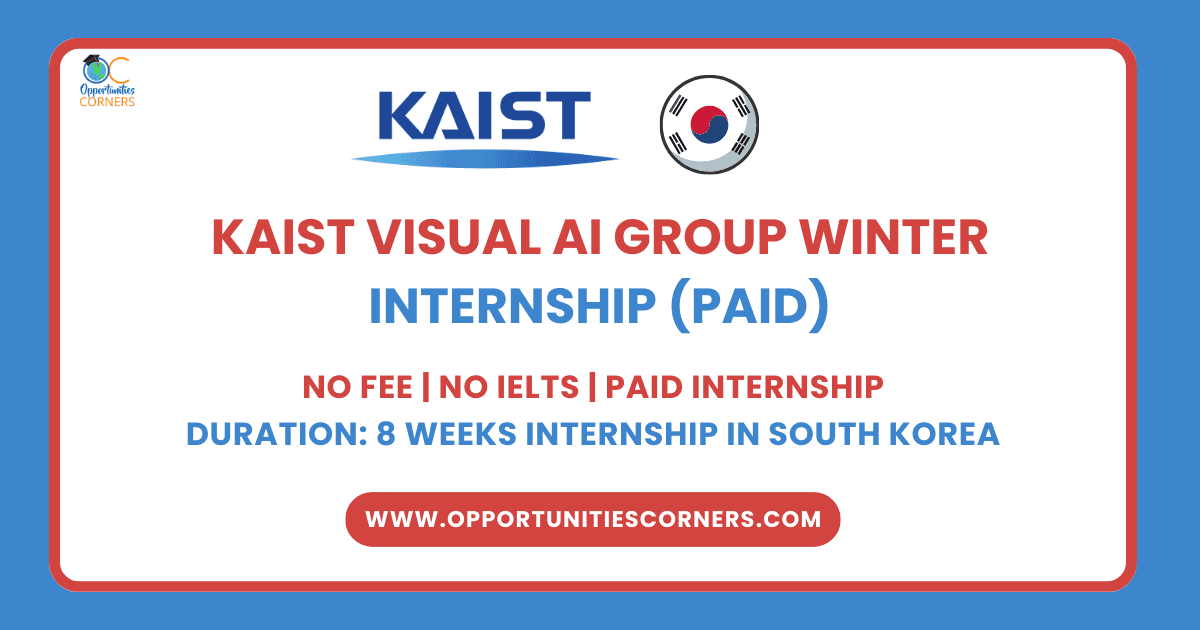KAIST Visual AI Group Winter Internship 2025 (PAID)

KAIST Visual AI Group Announces Paid Winter Internship for 2025
The Korea Advanced Institute of Science and Technology (KAIST) Visual AI Group is now accepting applications for its Winter Internship program, scheduled to run from December 22, 2025, to February 27, 2026. This paid research internship offers non-KAIST students, including international students not currently enrolled in Korean institutions, the opportunity to contribute to cutting-edge machine learning solutions for visual data.
Opportunity Overview: KAIST Visual AI Winter Internship
The internship, based in Daejeon, South Korea, spans approximately eight weeks and requires interns to be physically present in the lab. The primary objective is to identify and nurture talented undergraduate students, providing them with hands-on experience in developing advanced AI technologies.
Key Details:
Host Country: South Korea University: Korea Advanced Institute of Science and Technology (KAIST) Duration: December 22, 2025 – February 27, 2026 Location: Daejeon, South Korea Deadline: November 15, 2025
Research Focus and Benefits
Interns will engage in research areas including diffusion models, generative models for diverse data types, 3D generation and editing, foundation models (LLMs/VLMs), video generative models, neural rendering, and AI for scientific applications. Successful candidates will receive financial compensation and access to KAIST's computing resources.
It's important to note that due to administrative restrictions, students enrolled in universities outside of Korea cannot receive payment. However, all interns will have access to the necessary resources to conduct their research.
Eligibility and Application Requirements
The internship is open to students who are not currently enrolled at KAIST. International students not enrolled in any Korean institution are also encouraged to apply. Required application documents include:
Transcript CV/Resume (including research, internship, and project experience, as well as programming skills)
How to Apply The application process is entirely online. Interested candidates can find the application link on the official KAIST website.
Expert Perspective: The Importance of International Research Collaboration
Dr. Emily Carter, a professor of Computer Science specializing in AI education at Stanford University, emphasizes the critical role of international research internships. "These programs provide invaluable opportunities for students to gain practical experience in diverse research environments. Exposure to different methodologies and perspectives is crucial for fostering innovation and addressing global challenges in AI," she notes. "KAIST's initiative contributes significantly to building a global network of AI researchers."
Historical Context: South Korea's Investment in STEM Education
South Korea's commitment to STEM (Science, Technology, Engineering, and Mathematics) education has deep historical roots. Following the Korean War, the nation strategically invested in education and technology to drive economic growth. This emphasis led to the establishment of institutions like KAIST, which have played a pivotal role in South Korea's transformation into a technological powerhouse. Scholarships and research opportunities, like the KAIST Visual AI Group Winter Internship, are a direct result of this long-term investment and commitment to fostering innovation.
The Broader Impact on AI Development Beyond individual student development, programs like the KAIST Visual AI Group Winter Internship contribute to the broader advancement of artificial intelligence. By bringing together diverse talent and fostering collaboration, these initiatives accelerate the pace of discovery and innovation in the field. The research conducted by interns can lead to breakthroughs in areas such as image recognition, natural language processing, and robotics, ultimately benefiting society as a whole.
Current Context: The Global Demand for AI Expertise
The demand for skilled AI professionals is rapidly increasing worldwide. According to a recent report by McKinsey, AI technologies could contribute trillions of dollars to the global economy in the coming years. However, a shortage of qualified AI experts remains a significant challenge. Internships like the KAIST Visual AI Group Winter Internship help address this skills gap by providing students with the training and experience they need to succeed in this rapidly evolving field.
Another Expert Viewpoint: Building a Foundation for Future Innovation
Professor Lee Min-ho, head of the KAIST Visual AI Group, believes that investing in young talent is essential for the future of AI. "Our internship program is designed to provide students with a challenging and rewarding experience that will prepare them for leadership roles in the field," he explains. "We are committed to fostering a culture of innovation and collaboration, and we believe that our interns will play a key role in shaping the future of AI."
Originally sourced from: Opportunities Corners
